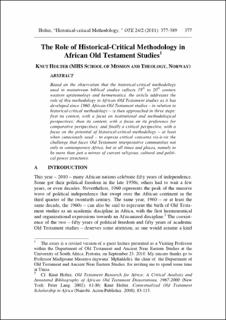The role of historical-critical methodology in African Old Testament studies
Peer reviewed, Journal article
Published version
Permanent lenke
https://hdl.handle.net/11250/2656260Utgivelsesdato
2011Metadata
Vis full innførselSamlinger
- Artikler / Articles [1178]
- Publikasjoner fra CRIStin [1103]
Originalversjon
Old Testament Essays. 2011, 24 (2), 377-389.Sammendrag
Based on the observation that the historical-critical methodology used in mainstream biblical studies reflects 18th to 20th century western epistemology and hermeneutics, the article addresses the role of this methodology in African Old Testament studies as it has developed since 1960. African Old Testament studies – in relation to historical-critical methodology – is then approached in three steps: first its context, with a focus on institutional and methodological perspectives; then its content, with a focus on its preference for comparative perspectives; and finally a critical perspective, with a focus on the potential of historical-critical methodology – at least when consciously used – to express critical concerns vis-à-vis the challenge that faces Old Testament interpretative communities not only in contemporary Africa, but at all times and places, namely to be more than just a mirror of current religious, cultural and political power structures.
